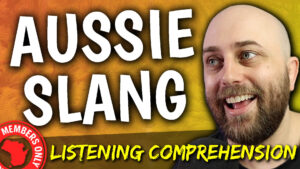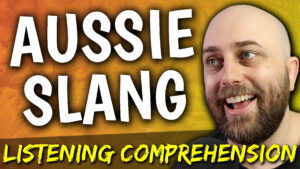
AE 1201 - Expression
Sit On Your Hands
Learn Australian English in this expression episode of the Aussie English Podcast.
These episodes aim to teach you common English expressions as well as give you a fair dinkum true-blue dose of Aussie culture, history, and news and current affairs.

In today's episode...
Welcome back to a new episode of the Aussie English Expression series, where we explore and explain popular phrases and idioms in the English language.
In today’s episode, we will dive into the expression “sit on your hands.” I will define the expression and break down the meaning of each word, so you can better understand its use. Then, I will provide some practical examples to help you master the expression’s context and usage.
We will also do a quick dip on its history, with a light chew on how it came to be a part of everyday language.
Join me as we will also analyze the pronunciation of the sentences, paying attention to intonation, stress, and speech connections, which will help you sound more like a native English speaker.
To make the most of this episode, be sure to grab a paper and pen and listen carefully to the audio clip from a popular TV series.
I hope that you find this episode to be a fun learning experience, and that you enjoy it as much as I did creating it!
Thanks for always being a loyal listener!
Don’t forget to download this episode’s FREE worksheet!
See you in the next episode!
** Want to wear the kookaburra shirt? **
Get yours here at https://aussieenglish.com.au/shirt
Improve your listening skills today – listen, play, & pause this episode – and start speaking like a native English speaker!
Listen to today's episode!
This is the FREE podcast player. You can fast-forward and rewind easily as well as slow down or speed up the audio to suit your level.
If you’d like to use the Premium Podcast Player as well as get the downloadable transcripts, audio files, and videos for episodes, you can get instant access by joining the Premium Podcast membership here.
Get more out of every episode!

Premium Podcast members get access to...
- All 900+ podcast episodes including member-only episodes
- Member-only episode video lessons
- Downloadable transcript PDFs & audio files for every episode

Recent Episodes:


AE 1361 – The Goss: TV Shows We’re Currently Binge Watching [Members Only]

AE 1360 – 20 English Idioms Explained | Members Only

AE 1359 – 20 English Idioms To Transcribe

AE 1358 – How to Pronounce -ED Endings in Australian English [Members Only]

AE 1357 – How to Pronounce -ED Endings in Australian English

AE 1356 – Will AI Save Us Or Replace Us?

AE 1355 – 20 Aussie Slang Sentences Explained [Members Only]

AE 1354 – 20 Aussie Slang Sentences to Transcribe

Share

Join my 5-Day FREE English Course!
Complete this 5-day course and learn how to study effectively with podcasts in order to level up your English quickly whilst having fun!


Want to improve a specific area of your English quickly and enjoyably?
Check out my series of Aussie English Courses.
English pronunciation, use of phrasal verbs, spoken English, and listening skills!

Have you got the Aussie English app?
Listen to all your favourite episodes of the Aussie English Podcast on the official AE app.
Download it for FREE below!



Want to improve a specific area of your English quickly and enjoyably?
Check out my series of Aussie English Courses.
English pronunciation, use of phrasal verbs, spoken English, and listening skills!
Leave a comment below & practice your English!






Responses